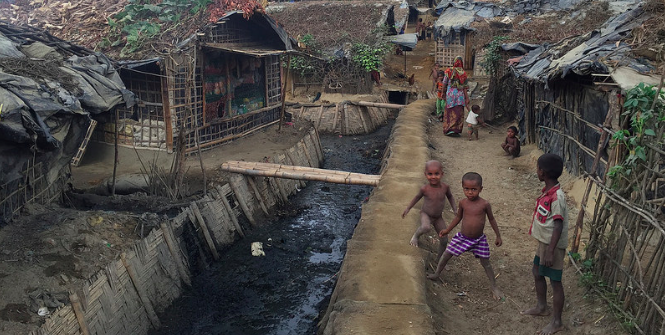Extending the “System” of International Criminal Law

Although the recent decision concerning the International Criminal Court’s jurisdiction on the Rohingya issue is encouraging, it cannot act alone to prevent crimes against humanity.
Despite its short life of 16 years, the International Criminal Court is no stranger to controversy. Indeed, contestation started before the ICC began operations. Throughout the drafting of the Rome Statue, the ICC’s founding treaty, states such as Germany argued vehemently for the ICC to be granted universal jurisdiction, while the permanent five members of the United Nations Security Council remained reticent to relinquish full jurisdiction over the core international crimes, including war crimes, crimes against humanity, and genocide. Even after the Rome Statute was passed and the ICC was founded, albeit without universal jurisdiction, it remained embattled.
Furthermore, given that the United States and Israel have not ratified the Rome Statute, the ICC is criticised for being unable to hold powerful western States accountable. This includes alleged atrocity crimes committed by US personnel in Iraq and Afghanistan, and Israeli soldiers’ actions in Palestine.
All of this begs the question: what is the point of a permanent international criminal tribunal if it is not truly universal?
Against this backdrop of jurisdictional contestation, the ICC’s recent decision on jurisdiction over alleged deportations of Rohingya people from Myanmar to Bangladesh re-establishes the ICC’s importance. Not only did the request made by Fatou Bensouda, the ICC Prosecutor, to the Pre-Trial Chamber show a willingness to test and reaffirm her jurisdictional reach, it was also a constructive way to extend the “system” of international criminal law, and in doing so, appropriately challenge the relationship between state power and the law in the international order.
The arguments outlined below are two-fold. First, the ICC should continue to extend the system of international criminal law in relation to “recognising” and locating its jurisdictional reach, including over alleged deportations of Rohingya people from Myanmar to Bangladesh. Despite the ICC’s acknowledged shortcomings, the recent decision demonstrated a willingness to use the law as a “standard” and thus “fill the gap” with respect to de facto impunity. Second, while the ICC remains an important addition to the system of international criminal law, it is not, in and of itself, the “system.” Rather, extending the system of international criminal law requires a multiplicity of interstate, state, and non-state actors willing to use the law and to view international criminal law as a “standard.”
The ICC’s decision was controversial, but necessary
In keeping with its short history, the recent ICC decision was controversial. On 6 September 2018, the Pre-Trial Chamber of the ICC, decided by 2–1 majority:
- That the Court may exercise jurisdiction over alleged deportations of Rohingya people from Myanmar to Bangladesh. Although Myanmar is not a State Party to the Rome Statute, the ICC Pre-Trial Chamber recognised that the cross-border nature of the crime against humanity of deportation included the territory of Bangladesh, a State Party. Specifically, the Chamber confirmed that the “element of the crime of deportation is forced displacement across international borders, which means that the conduct related to this crime necessarily takes place on the territories of at least two States.” The Pre-Trial Chamber also made clear that the ICC had jurisdiction over other crimes against humanity under the Rome Statute and customary international law other than deportation, such as the crime against humanity of persecution.
- It also determined that any such preliminary investigation initiated by the Prosecutor should be concluded in a reasonable time, irrespective of the complexity of the assessment.
Three important observations can be made in response to the decision by the Pre-Trial Chamber.
First, this request made by the Prosecutor to the Pre-Trial Chamber was an important testing of the waters, so to speak, in terms of establishing not only her juridical reach, but her legal obligation or “responsibility to prosecute.” In this respect, the Pre-Trial Chamber appreciated that the attempt by the Prosecutor to extend the jurisdiction of the Court was contentious. Article 19 (3) under “Challenges to the jurisdiction of the Court or the admissibility of a case” of the Rome Statute states that the “Prosecutor may seek a ruling from the Court regarding a question of jurisdiction or admissibility.” In this respect, Pre-Trial Chamber acknowledged that the “position advanced” by the Prosecutor was:
“quite controversial based on the different readings of the Court’s statutory documents and the literature interpreting this provision. The Chamber recalls that the core question raised by the Prosecutor is a question of jurisdiction, i.e. “whether the Court may exercise jurisdiction under article 12(2)(a) over the alleged deportation of the Rohingya people from Myanmar to Bangladesh.”
Second, and following from the above, the Pre-Trial Chamber’s decision to confirm jurisdiction was similarly contentious and demonstrated a view that the law is a “standard”, as opposed to the traditional vertical concept of law where it is enforced in a hierarchical manner through the use of coercion or force. In other words, it demonstrated the Pre-Trial Chamber’s commitment to the law – irrespective of any potential geopolitical impact – in relation to discerning the Court’s jurisdiction. While the Pre-Trial Chamber recognised that ‘jurisdiction of the Court is clearly subject to dispute with Myanmar’, it also asserted its uncontroversial right and obligation under international law to determine its own jurisdiction.
In this regard, the Pre-Trial Chamber’s decision was another sign that the Court is fully adherent to the dictates of the Rome Statute when examining its judicial reach and carrying out its respective obligations created therein. In doing so, it also signalled that Myanmar leaders were not fully immune to core international crimes. In fact, the Pre-Trial Chamber maintained that Myanmar was not exempt from the non-derogable legal obligations placed on all states, as well as individuals, to prevent and punish atrocity crimes that has formed, in part, from treaties and “well established judicial interpretations” from tribunals such as the World War Two trials and the ICTY. These universal obligations included, among other things, the prohibition against deportation as a crime against humanity.
Third, the Prosecutor’s attempt to test the jurisdictional waters showed both her unwavering commitment to carry out her mandate wherever legally justified and irrespective of politics, and as a consequence, implicated other instances where atrocity crimes have spilt over international borders. Specifically, the Myanmar examination in combination with similar inquiries by the Office of the Prosecutor (“OTP” or “Office”) in Afghanistan, Georgia, and Palestine is compelling evidence that the Prosecutor’s attention has always been global, not African. In this respect, the OTP’s request and Pre-Trial Chamber’s decision has repercussions in other conflicts around the world, such as the influx of Syrian refugees in Jordan, a State Party to the Rome Statute.
There are many reasons why the ICC’s decision on jurisdiction over alleged deportations of Rohingya people was and is encouraging. However, most important was its normative value – namely that it demonstrated a willingness to adhere to the law over politics and apply international criminal law as a “standard.” Although this body of law and the ICC as an institution are both fledging in nature, the ICC’s decision was a justified and promising extension of the “system” of international criminal law.
Nonetheless, the ICC should not be considered the “system”, nor the only institution, to ensure accountability for those most responsible for humanity’s worst crimes. While continuing to rely on a multiplicity of state, non-state, and interstate actors to help shape the international criminal justice movement, it behoves sovereigns like Australia to play a greater role in holding senior leaders accountable for their participation in atrocity crimes.
Kip Hale currently serves as a legal advisor overseeing various atrocity crimes investigations.
Melinda Rankin is postdoctoral research fellow in the School of Political Sciences and International Studies at the University of Queensland, Australia.
This article is an extract from Kip Hale and Melinda Rankin’s article in Volume 72, Issue 6 of the Australian Journal of International Affairs titled ‘Extending the “System” of International Criminal Law? The ICC’s Decision on Jurisdiction over Alleged Deportations of Rohingya People‘. It is republished with permission.





